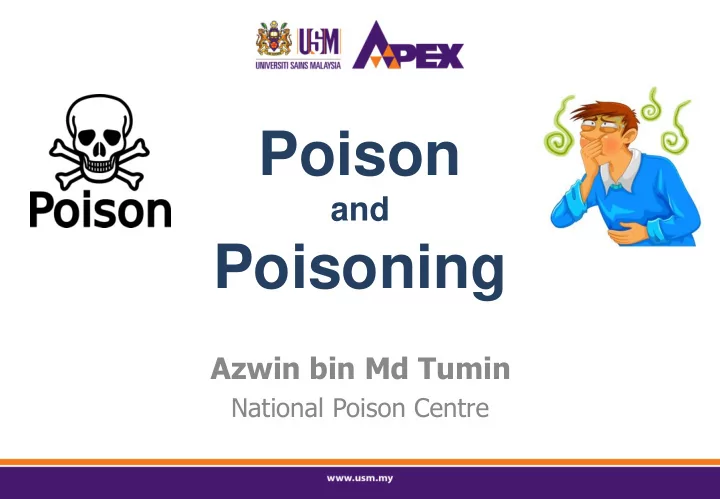

Poison and Poisoning Azwin bin Md Tumin National Poison Centre
Outline a. Definition b. Forefathers of toxicology c. Famous poisoning cases d. Misconception about poisoning e. Basic principles of poisoning f. Factors influencing toxic effects g. Take home points
Definition • Poison : Substance that, taken into or formed within the organism, impairs the health of the organism and may kill it. • Poisoning : Intoxication, morbid condition produced by a poison. • Toxicology : Scientific discipline involving the study of the actual or potential danger presented by the harmful effects of substances on living organisms and ecosystems, of the relationship of such harmful effects to exposure, and of the mechanisms of action, diagnosis, prevention and treatment of intoxications. • Source: IUPAC Glossary, Environmental Health and Toxicology, US Dept of Health & Human Services
Definition • Toxic agent is anything that can produce an adverse biological effect. It may be chemical, physical, or biological in form. • Toxic agents may be: o Chemical (such as pesticides, pharmaceuticals) o Biological (such as snake venom, mushroom) o Physical (such as radiation)
Forefathers of Toxicology Paracelsus (~1500AD) Specific chemicals are responsible for the toxicity of a plant or animal poison. Small doses of a substance might be harmless or beneficial whereas larger doses could be toxic Dose-response relationship, a major concept of toxicology.
Orfila (~1800 AD) Father of toxicology Prepared a systematic correlation between the chemical and biological properties of poisons of the time
Famous Poisoning Cases
Misconception about poisoning Poison ≠ Antidote Poisoning ≠ Antidote administration Amount/Level ≠ Effect of poison Poison ≠ Measurable in biological sample Natural compounds ≠ safe compounds Synthetic agents ≠ toxic agents ‡
Basic principles of poisoning • All substances are poisons; it is the dose that makes the poison (Paracelsus)
Basic principles of poisoning • Dose-response relationship Establishes causality that the chemical has in fact induced the observed effects Establishes the lowest dose where an induced effect occurs – the threshold effect Determines the rate at which injury builds up - the slope for the dose response.
Basic principles of poisoning • Dose estimates (LD50) Dose-response curves are used to derive dose estimates of chemical substances. A common dose estimate for acute toxicity is the LD50 (Lethal Dose 50%). This is a statistically derived dose at which 50% of the individuals will be expected to die. (from animal study)
Factors Influencing Toxic Effects • Form and innate chemical activity • Dosage, especially dose-time relationship • Exposure route • Species • Age • Sex
Factors Influencing Toxic Effects • Ability to be absorbed • Distribution within the body • Metabolism • Excretion • Presence of other chemicals
Take Home Points • NOT every poison has its own antidote • NOT every poisoning case needs antidote administration • LD50 is the dose at which 50% of the population affected expected to die • Several factors influencing toxic effects includes form, dosage, exposure route, age, species, sex & pharmacokinetic parameters
References 1. Introduction to Toxicology, CHEST Training Package for the Health Sector, European Commission (EU) retrieved from http://ec.europa.eu/health/ph_projects/2003/action3/d ocs/2003_3_09_a21_en.pdf 2. Toxlearn - Module 1: Introduction to Toxicology and Dose-Response retrieved from https://toxlearn.nlm.nih.gov/Module1.htm
Thank You Transforming Higher Education For A Sustainable Tomorrow
Recommend
More recommend